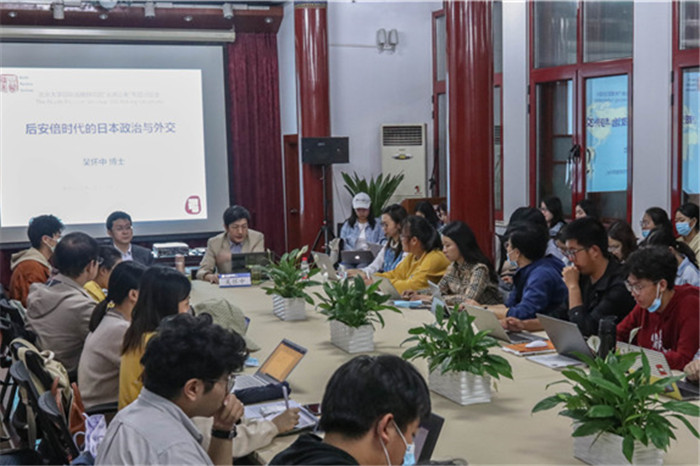On the evening of September 29th, 2020, the Institute of International & Strategic Studies (IISS), Peking University (PKU) held the 42nd seminar of "North Pavilion Seminar" lecture series. Wu Huaizhong, Deputy Director and Research Fellow at the Institute of Japanese Studies, Chinese Academy of Social Sciences (CASS), Executive Director of Chinese Association of Asia-Pacific Studies, and Executive Director of Chinese Association for Japanese Studies, gave a lecture entitled "Japan's Politics and Diplomacy in the Post-Abe Era". The seminar was hosted by Gui Yongtao, Vice President of the IISS and Vice President of the School of International Studies (SIS), PKU.

Based on the current political changes in Japan and the arrival of Yoshihide Suga as a "prime minister of the people" in the post-Abe era, Wu Huaizhong gave an in-depth explanation of the current internal and external environment Japan is facing, covering all aspects of domestic affairs, economy, military, and foreign affairs. He held that the governing approach in the post-Abe period will be characterized by "following the previous approach in general and revise it partially". He also pointed out that the three major issues Yoshihide is facing since he took office, namely the prevention and control of COVID-19 pandemic, economic recovery, and the hosting of the Olympic Games, will become important indicators for the public to measure his performance in office and thus affect the length of his term.
Wu believed that the new Japanese government may also be an opportunity for China, especially after China and Japan started close then drifted apart for the rest of the year in 2020 and while China is facing a relatively tense international situation and is in urgent need to deal with the current development environment. He hoped the two countries will mobilize all positive factors, create conditions for communication, suppress unfavorable factors, and bring the bilateral relations closer again at the end of 2020.
Talking about the current international situation, Wu believed that Japan plays a crucial role in China's two major foreign strategic goals, namely "making every effort to retard the U.S. containment of China and avoid other countries following the U.S." and "counter-disengagement and counter-blockade" to create a favorable development and security environment in response to reverse globalization. In addition, compared with their communication with Europe and the U.S., China and Japan have a solid foundation of cultural exchanges and an understanding in communication. They should attach more attention to further communication in five dimensions: the situation in the East China Sea, high-level exchanges, economic, trade, and tourism exchanges, cooperation in COVID-19 pandemic prevention, and decision-making judgment on Japan, so as to help China-Japan relations take off again.
During the Q&A session, Wu Huaizhong had exchanges of ideas and discussions with the teachers and students present at the seminar on issues such as Japan's economy, Indo-Pacific strategy, and postponement of the Olympic Games. (Contributed by Yang Bingyi)
Editor: Li Fangqi, Zeng Chuyuan Photographer: Zheng Peijie

